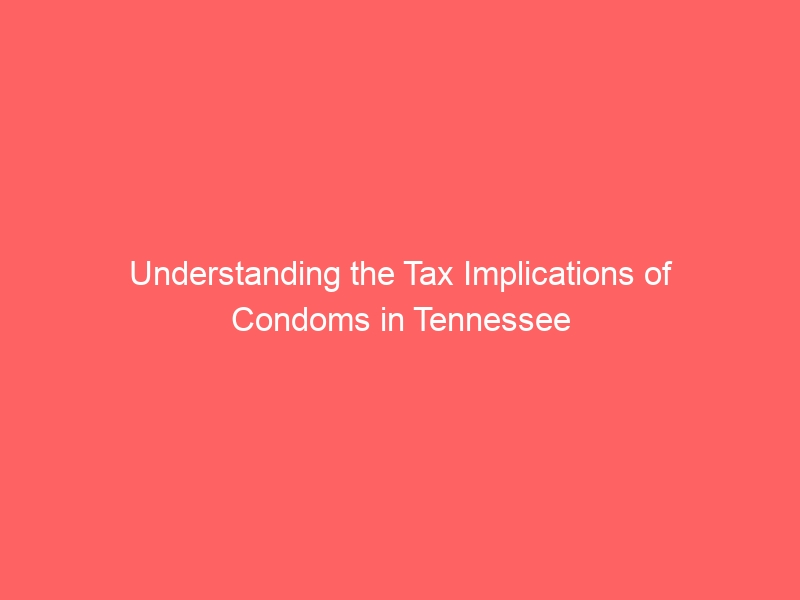As we dive into the complexities of taxation, we can’t help but wonder: are condoms taxed in Tennessee? This question not only highlights the financial aspects of health products but also sparks a broader discussion on public health and accessibility. We’ve seen how sales tax rates can impact consumer choices, particularly when it comes to essential items like condoms. By examining the historical context and current legal framework, we aim to shed light on the implications of these taxes. Together, we’ll explore how advocacy and education can influence both policy and public perception in our state.
The Sales Tax Rate on Condoms
We’re noticing that the sales tax rate on condoms in Tennessee can significantly impact their affordability. It’s clear that higher taxes can deter people from purchasing them. We’ve seen how this can lead to potential public health issues. Many of us believe that reducing the tax could promote safer practices. It’s something we should consider as a community for better access to essential health products.
Historical Context of Condom Taxation in Tennessee
Condom taxation in Tennessee has evolved over the years, reflecting changing societal attitudes and public health priorities. We’ve seen shifts in policy that mirror broader discussions about sexual health and responsibility. As conversations around reproductive health became more prominent, so did the push for fairer taxation on condoms. Our understanding of public health has led to advocates challenging the notion of taxing essential health products. This sets the stage for a comparative analysis with other health products and their respective tax implications.
Comparative Analysis with Other Health Products
The tax implications for condoms in Tennessee can be quite different from those of other health products, and it’s interesting to see how they compare. While many health products, like over-the-counter medications, are often exempt from sales tax, condoms don’t enjoy the same benefits. We’ve noticed that this can create a financial burden on consumers looking for safe sex options. In contrast, items like contraceptive pills may be tax-exempt, highlighting the inconsistency in tax policy. Ultimately, it raises questions about the priorities in public health and consumer rights that we should consider.
Public Health Perspectives on Condom Accessibility
Access to condoms plays a crucial role in promoting public health, and we’re committed to ensuring everyone has what they need for safe practices. We recognize that increased accessibility leads to better health outcomes for individuals and communities. By making condoms readily available, we’re helping to reduce the rates of sexually transmitted infections and unintended pregnancies. We believe that education and access go hand in hand, empowering individuals to make informed choices. Together, we’re fostering a culture of safety and responsibility in sexual health.
Impact of Taxation on Consumer Behavior
Higher taxation on condoms might discourage some of us from purchasing them regularly. We might prioritize our spending on other essentials if the price goes up. Some of us could even reconsider our choices about sexual health if we feel the financial burden. It’s possible that higher prices lead to decreased usage, impacting public health outcomes. Ultimately, we need to consider how taxation shapes our decisions and behaviors regarding safe sex.
Legal Framework Governing Condom Sales
Understanding the legal framework governing condom sales in Tennessee is crucial for us as we navigate the tax implications involved. We’ve got to be aware of the state laws that regulate the sale and distribution of contraceptives. It’s important for us to understand the licensing requirements for retailers selling these products. Additionally, we should consider how local ordinances might affect where and how condoms can be sold. By staying informed, we can better address the complexities of taxation in this area.
Advocacy and Legislative Efforts
We’re actively engaging with lawmakers to push for more supportive legislation regarding tax policies on condoms in Tennessee. We’ve been collaborating with public health advocates to highlight the importance of accessible contraceptive options. Our team’s been reaching out to community organizations to gather support for our initiatives. We’re also organizing outreach events to raise awareness about the economic burden of excessive taxes on essential health products. Together, we’re committed to creating a more equitable framework for reproductive health in our state.
Educational Programs and Tax Funding
Educational programs on sexual health could benefit from increased tax funding in Tennessee. We’ve seen how proper education can lead to healthier choices among young people. By investing more in these programs, we can reduce misinformation and promote safer practices. It’s crucial for us to advocate for funding that prioritizes sexual health education. Together, we can make a significant impact on our community’s well-being.
Future Trends in Condom Taxation in Tennessee
Future trends in condom taxation in Tennessee might reshape how we perceive and purchase these essential items. We’re noticing discussions around reducing or eliminating the sales tax on condoms to promote public health. This shift could encourage more people to buy condoms, leading to safer sexual practices. Additionally, we’re seeing advocacy groups pushing for tax reforms that align with broader health initiatives. Ultimately, these trends could redefine our approach to sexual health and responsibility in the state.
Conclusion
In considering the tax implications of condoms in Tennessee, we recognize the need for change to enhance public health outcomes. By advocating for lower taxes on essential health products, we can make safer practices more affordable and accessible to everyone. It’s clear that equitable tax policies are crucial for fostering informed choices regarding sexual health. Engaging with lawmakers and community organizations together amplifies our collective voice in this important matter. Ultimately, our efforts can contribute to a healthier, more informed community where everyone’s reproductive health needs are prioritized.
If you’re intrigued by the discussion around condoms and their various implications, you might find it fascinating to explore the surprising similarities between condoms and balloons. This engaging article delves into the unexpected connections between the two, providing a unique perspective that’s both informative and entertaining. Check it out here: the surprising similarities between condoms and balloons.
